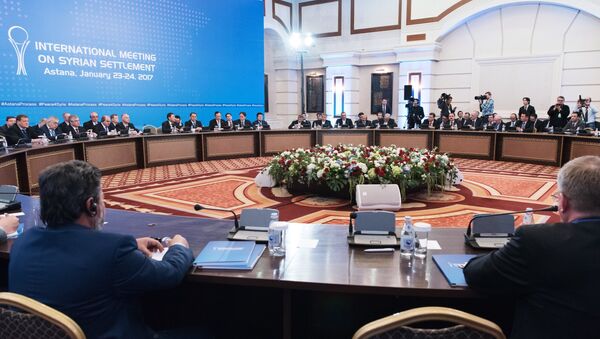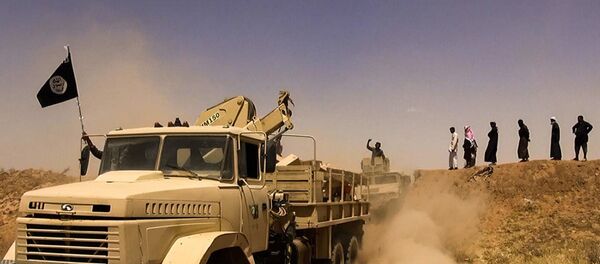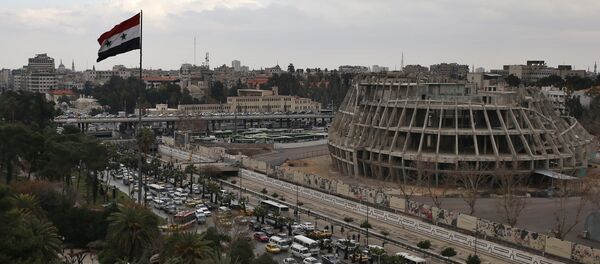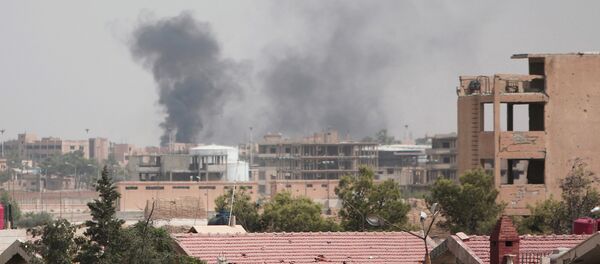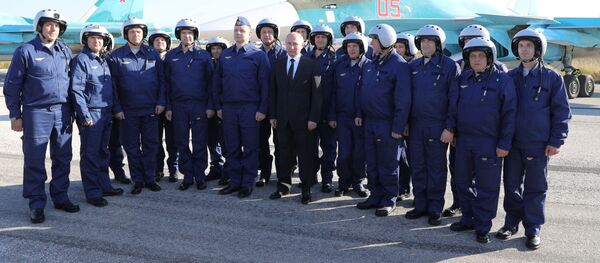ASTANA (Sputnik) — The eighth high-level international meeting on Syria to take place in the Kazakh capital, which will take place immediately ahead of the holiday season, comes at a crossroads between the failure of Geneva-8 in early December and the upcoming National Dialogue Congress in Sochi in early 2018.
Therefore, this meeting may well produce a Christmas miracle and become the bridge that establishes continuity and succession between the Geneva peace process and the Sochi Congress.
READ MORE: Astana Plans to Host 7th Round of Syria Peace Talks in October
Preparation for the Sochi Congress is one of the main topics on the Astana agenda.
"At least, there will be an endorsement of Sochi Congress. But maybe participants will also try to push forward some agenda for Sochi — a constitution, elections etc.," a source familiar with the course of the talks told Sputnik.
These two issues are precisely what the Sochi Congress of National Dialogue, expected to take place in January-February 2018, is going to be about.
Just before joining the Astana talks on December 22, de Mistura will travel to Moscow on Thursday.
Participants
The Russian delegation will be headed, as always, by special presidential envoy for Syria Alexander Lavrentiev, and will also include Director of Middle East and North Africa Department in the Foreign Ministry Sergey Vershinin and Gen. Stanislav Gadzhimagomedov.
READ MORE: Putin, Erdogan Talk Syria, Astana Peace Process
The Iranian delegation is led by Deputy Foreign Minister for Arab and African Affairs Hossein Jaberi Ansari and the Turkish team by Foreign Ministry's Deputy Undersecretary Sedat Onal.
The Syrian government delegation is headed by Syria's Envoy to the United Nations in New York Bashar Jaafari.
Thus, Free Syrian Army Chief of Staff Ahmed Berri is no longer going to be the head of the delegation. He will be replaced by a politician, the representative of the Coalition for Syrian Revolution and Opposition Forces, and former head of the "interim government" that the coalition proclaimed, Ahmad Toma.
Yahya Aridi, a political adviser, is also going to be in the delegation. Nasr Hariri, head of the unified opposition delegation for political negotiations in Geneva, may also come, according to Sputnik's sources.
The UN side is represented by a group of high-level experts. Special Envoy for Syria Staffan de Mistura is also expected to join on December 22, right after his visit to Moscow on Thursday.
READ MORE: Russian MoD Denies Allegations of Strikes in Syria's Idlib
Jordan and the United States will act as observers. US Acting Assistant Secretary for Near East Affairs David Satterfield, who attended previous meetings, is not expected to arrive for Astana-8. It is still unclear who can come in his place. It can be Stephanie Williams, US adviser on the Syrian file, who was present in Geneva earlier in December during the intra-Syrian talks there.
More About Agenda
The only issues that have not been finalized at the previous seven Astana meetings are from the so-called humanitarian package — agreements on the release of detainees and humanitarian demining.
Without a doubt, they will be raised at Astana-8. However, the guarantor states and the Syrian sides could only reach an agreement in principle on them, leaving the coordination of details for the Syrian National Dialogue Congress in Sochi in early 2018.
READ MORE: Astana Talks: Neutral Mediator May Help Warring Syrian Parties Release Detainees
These topics are on the table as two preliminary documents. The first one suggests establishing a working group comprised of Syrian government representatives, the opposition, the United Nations and possibly the International Committee of the Red Cross (ICRC), with a view to organize the release by conflicting parties of arbitrarily detained persons and the hand-over of bodies, and ascertain the fate of missing persons.
The other document proposes the creation of a broad international coalition with the participation of the UN Mine Action Service (UNMAS) and UNESCO to work on humanitarian demining in the country.
Turkey and the opposition see the release of detainees as a priority, while humanitarian demining is of particular interest for the Syrian government and Russia.
READ MORE: US Training New Militants to Counter Russia in Syria – Lawmaker
The detainees issue is particularly sensitive, because the two Syrian sides have very differing views on the numbers, and because names in the proposed lists need actual verification as many of them may no longer be alive.
Both the Syrian opposition delegation and the UN special envoy for Syria called on guarantor states prior to Astana-8 to achieve progress on detainees.
Implementation of de-escalation in Idlib and the humanitarian situation in Eastern Ghouta is one of the main concerns the Syrian opposition recently voiced in Geneva at the eighth round of intra-Syrian talks, as well as at the previous meetings on Syria in Astana.
All these questions are likely to be reflected in the final communique on Friday. However, endorsement of the Sochi Congress may come as a separate statement, because the Astana format of talks is technically supposed to focus on military issues only.
READ MORE: Macron: Assad Will Stay in Power as Russia, Iran 'Won on the Ground' in Syria
The main achievement of Astana meetings has been establishment the four de-escalation zones in the country: the northwestern Idlib province and parts of the neighboring Latakia, Hama and Aleppo provinces; the north of Homs province; eastern Ghouta near Damascus; and certain parts in the country's southern Daraa and Quneitra provinces.

